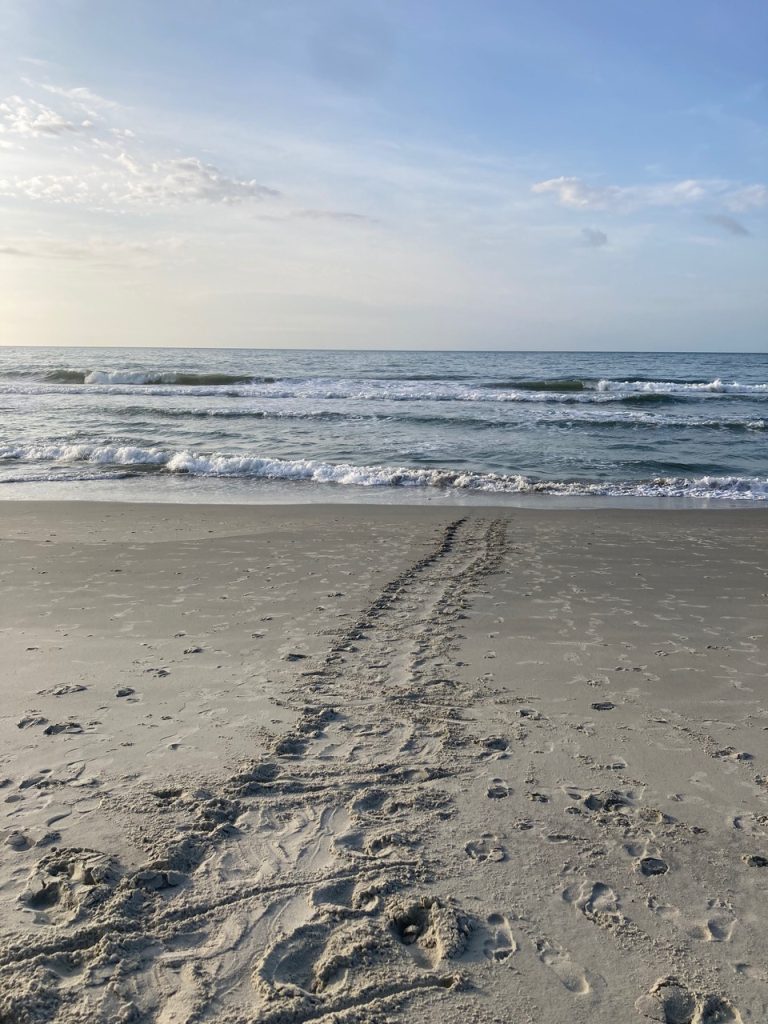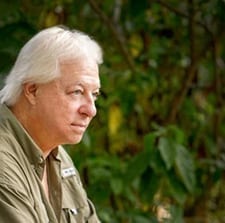A Scrape In The Sand
September 7, 2023By Tom Poland
Sand washes away. Memories last forever.
The year was 1982. That would have been South Carolina Wildlife magazines 28th anniversary. I worked in film then and I felt I was part of the magazine staff though I wasn’t. While I wondered how it’d be to work in print, I went afield and one place took me afar, beyond the coast, beyond the continent even. I went to film nesting loggerhead sea turtles at Cape Romain National Wildlife Refuge. To say it was an adventure serves it no justice. It was epic, a Sir David Attenborough adventure, only I was a tad too young to realize it back then.

The sea’s going out and mother turtle is back at sea.
Memories of those days came back strong and clear thanks to a June 22 morning at the beach. A bit before 7 a.m. it was. My sister, Deb, had gone out for an early morning walk. She called me, excited. A loggerhead sea turtle had nested mere yards from our dune walkway. I was on my first cup of coffee. To the beach I went, coffee in hand. There, team members of the South Carolina United Turtle Enthusiasts, (SCUTES), clad in neon green Ts, were on their knees peering into the sand. One woman was carefully removing 131 eggs for relocation to a safer place.
That telltale scrape in the sand. There it was. Suddenly, it was 1982 again. I was sitting in a Jeep on a primitive barrier island at 2 a.m. watching the surf line for an emerging female sea turtle. No luck. Much later we spotted a scrape in the sand, as if someone had dragged a small chest ashore. It wasn’t filled with pirate’s booty. It held other riches, shiny ping-pong-sized eggs within a female turtle’s carapace. We gave her time to settle, time to begin laying and then we turned on the Sun Guns and began filming. So, I knew exactly what had transpired overnight to the accompaniment of surging surf—one of nature’s more mysterious rituals. Somehow a mother turtle had returned to where she herself hatched.
Back when I wrote scripts for nature documentaries, I wrote with Attenborough and his marvelous voice in mind. He gave me drama, pacing, and authority. Had we filmed the sea turtle swimming to her home beach my narration might have gone a bit like this …
‘And here, we have a loggerhead sea turtle intent on nesting. Having navigated 1,000 miles of sea, she’s not eaten in two months and yet she’s making the greatest journey of her time. She’s come to nest on the beach where she herself hatched. How does she do this? We have no idea.’ ”
All these years later, my official wildlife days far behind me, memories linger. Of all the jobs I had, those days afield on barrier islands refuse to be forgotten. Not so those pedestrian positions that accomplished one thing and one thing only—they paid bills and put food on the table. My wildlife days gave me food and something more, purpose. I felt I was making a small contribution to nature, atonement for all our human anti-nature ways.
I’ve been self-exiled from those official wildlife days thirty-six years now. Looking back, I realize I witnessed something extraordinary, something few see outside of naturalists, wildlife personnel, and volunteering friends of loggerhead sea turtles.
The passages we make … the sands of time keep falling … where do the years go?
South Carolina Wildlife magazine is approaching its 70th anniversary, and sea turtles still come ashore to lay their shiny clutches of eggs. I still go afield to photograph and write about nature and her legion of children, only now it’s just me. No uniform. No clock to punch. No paycheck, but rich and fond memories compensate me.
The jobs we take … the grains of sand keep falling … where did the years go?
I suppose others recall the cube farms they sat in, the lofty positions some held, the colleagues who scattered like a covey of South Georgia quail to be forgotten, and the inflated importance of what they did. Not me. Atop all my work memories, never to be forgotten, are rides in Boston Whalers to barrier islands where a midnight scrape in the sand meant one thing. “Time to go to work. Time to store away rare memories.”
Georgia native Tom Poland writes a weekly column about the South, its people, traditions, lifestyle, and culture and speaks frequently to groups in the South. Governor Henry McMaster conferred the Order of the Palmetto upon Tom, South Carolina’s highest civilian honor, stating, “His work is exceptional to the state.” Poland’s work appears in books, magazines, journals, and newspapers throughout the South.
Visit Tom’s website at www.tompoland.net
Email him at [email protected]






















